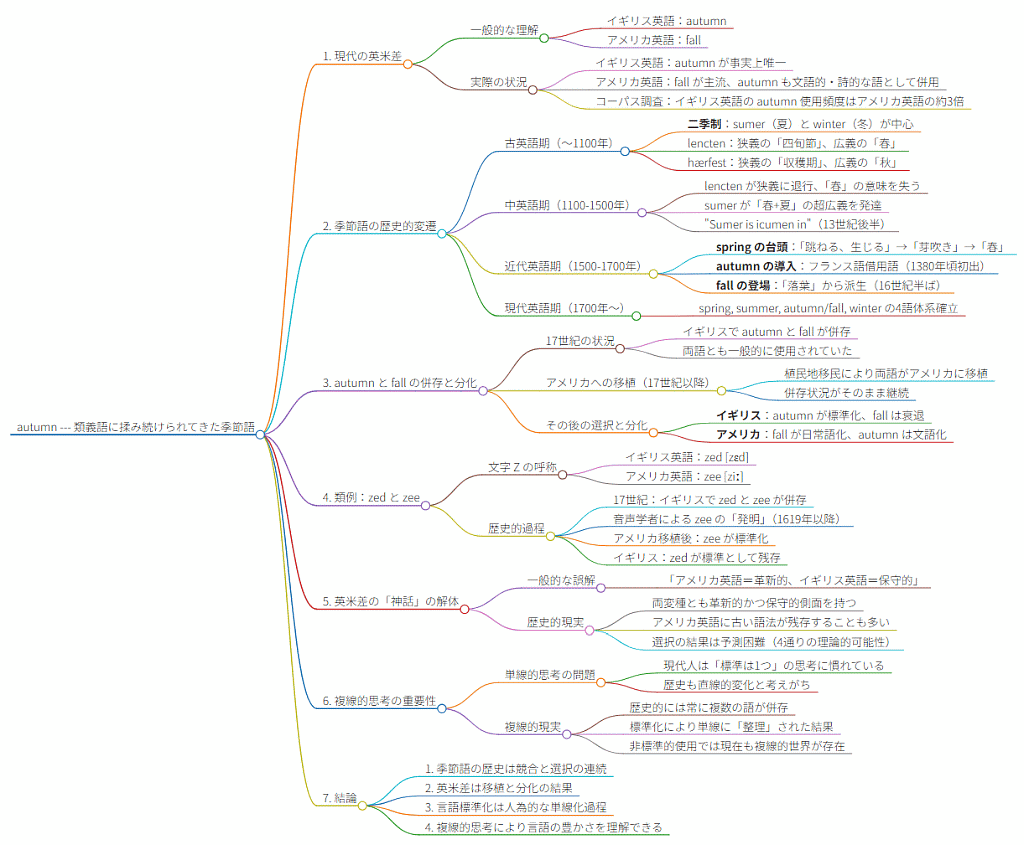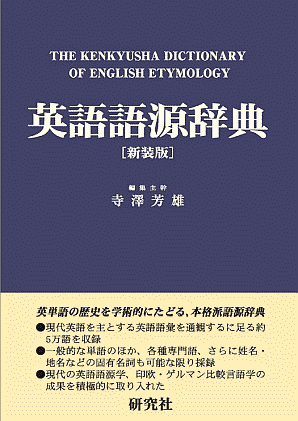2025-07-07 Mon
■ #5915. 2025年度の朝カルシリーズ講座の第3回「autumn --- 類義語に揉み続けられてきた季節語」をマインドマップ化してみました [asacul][mindmap][notice][kdee][hee][etymology][hel_education][lexicology][ame_bre][french][synonym][loan_word][borrowing][link]
6月21日(土)に,今年度の朝日カルチャーセンターのシリーズ講座「歴史上もっとも不思議な英単語」の第3回として「autumn --- 類義語に揉み続けられてきた季節語」が,新宿教室にて開講されました.Voicy heldio にて「#1478. 6月21日の朝カル講座では季節語に注目します --- 発売直後の『英語語源ハンドブック』も大活躍するはず」で予告した通りです.
この第3回講座の内容を markmap というウェブツールによりマインドマップ化して整理しました.復習用にご参照いただければ.

なお,この朝カル講座のシリーズの第1回,第2回についてもマインドマップを作成しています.「#5857. 2025年度の朝カルシリーズ講座の第1回「she --- 語源論争の絶えない代名詞」をマインドマップ化してみました」 ([2025-05-10-1]) および「#5887. 2025年度の朝カルシリーズ講座の第2回「through --- あまりに多様な綴字をもつ語」をマインドマップ化してみました」 ([2025-06-09-1]) の記事をご覧ください.
シリーズの第4回は,7月26日(土)に「but --- きわめつきの多義の接続詞」と題して開講されます.ご関心のある方は,ぜひ朝日カルチャーセンター新宿教室の公式HPより詳細をご確認の上,お申し込みいただければ.
2025-05-11 Sun
■ #5858. 言語において変わるものと変わらないもの --- 「いのほた言語学チャンネル」より [inohota][youtube][language_change][historical_linguistics][notice][christianity][oe][loan_word][borrowing]
同僚の井上逸兵さん(慶應義塾大学)と運営している YouTube 「いのほた言語学チャンネル」は,原則として毎週水曜日と日曜日の午後6時に最新回が配信されています.多くの方にご覧いただいています.ありがとうございます.おかげさまで言語学系のチャンネルとして少しずつ知られるようになってきました(チャンネル登録者は目下1.42万人).
1週間前に配信された「#333. 変化したことより変化してないことの方がおもしろい!?新しい歴史言語学」が,思いのほかよく視聴されています.20分ほどの動画です.ぜひご視聴いただければ.
この回のテーマは,本ブログでも中心的に取り上げてきた言語変化 (language_change) です.言語は常に揺れ動き,時代とともにその姿を変えていきますが,その一方で,変化しない要素も存在します.今回の動画では,この言語変化のダイナミズムと,その陰に潜む不変性に焦点を当てました.
まず言語変化研究の現状を概観し,歴史言語学 (historical_linguistics) における伝統的な視点を紹介しています.一般的に,歴史言語学は,ある言語に注目し,その変遷の歴史を追う学問と捉えられています.しかし,言語の歴史を捉える上で重要なのは,変化した事象だけでなく,連綿と受け継がれてきた,つまり変わらなかった事象にも目を向けることであると論じました.
社会や文化が大きく変動する際に,言語もまた影響を受け,発音が変容したり,新しい語彙が生まれたり,既存の語の意味が変わったり,あるいは文法が変化したりします.しかし,その一方で,社会の変化にもかかわらず,従来の形式を保持し続ける言語項目も存在します.動画では,この「不変化」の重要性について,具体的な例を挙げながら議論を展開しました.
特に興味深い例として簡単に触れたのが,英語における God という単語です.古英語期,イングランドにキリスト教が浸透する過程で,多くのキリスト教関連用語がラテン語から導入されました.しかし,「神」という最も根源的な概念を表わす単語は,対応するラテン語の deus を借りるなどではなく,ゲルマン語起源の god が生き残りました.なぜ,他の多くの用語がラテン語によって置き換えられたにもかかわらず,この単語については現代に至るまでその形を保ち続けているのでしょうか.この問いを探ることは,単なる語源研究にとどまりません.言語共同体の文化や歴史に迫ろうとする試みでもあります.以下に関連する過去記事を挙げておきます.
・ 「#32. 古英語期に借用されたラテン語」 ([2009-05-30-1])
・ 「#865. 借用語を受容しにくい語彙領域は何か」 ([2011-09-09-1])
・ 「#1619. なぜ deus が借用されず God が保たれたのか」 ([2013-10-02-1]),
・ 「#2663. 「オープン借用」と「むっつり借用」 (1)」 ([2016-08-11-1])
・ 「#3382. 神様を「大日」,マリアを「観音」,パライソを「極楽」と訳したアンジロー」 ([2018-07-31-1])
動画では,この他にも,言語(不)変化の背後にある力学について触れています.言語は,川の流れのように常に変化していきます.しかし,その川底には,時を超えて変わらない岩盤のような要素も存在しているのです.言語変化という現象を多角的に捉える視点を提供できたのであれば幸いです.
2025-05-03 Sat
■ #5850. 英語語彙史概論の講義内容を NotebookLM でポッドキャスト対談に仕立て上げました [ai][notebooklm][hel_education][vocabulary][lexicology][borrowing][loan_word][word_formation][derivation][compound][shortening][notice][youtube]
昨日の記事「#5849. Helvillian 5月号について語るAI音声対談」 ([2025-05-02-1]) で,Google NotebookLM の最新の音声対談化サービスを紹介した.あまりに革新的で便利,かつ応用可能性も広そうなので,いろいろといじって遊んでいるところである.
以前,英語語彙史概論の講義を行なったときの講義資料を Google NotebookLM に投げ込み,雑なプロンプトで音声対談生成を依頼した.待つこと数分.出力された音声ファイルを確認すると,改めて驚いたが,ほぼこのまま外に出せる出来映えだ.6分42秒ほどの対談に,90分講義のエッセンスが詰まっていた.
この驚きの対談とそれを紹介する音声配信を,本日 stand.fm の「英語史つぶやきチャンネル (heltalk)」より「英語語彙史概論 by NotebookLM」として公開した.さらにそこから YouTube 化(静止画像付き)でも配信したが,それが上掲の動画である(感激のコメント等を含めて11分29秒).
詳細な情報を対談という形式に落とし込める生成AIの技術は,情報の収集や理解にとどまらず一般の学びにも大きく貢献する可能性がある.日々英語史の音声配信をしている者として,脅威でもあるが大きな希望でもある.活用法と注意点を本格的に探っていきたい.
2025-04-20 Sun
■ #5837. ito で英語史 --- helito のお題案 [helito][helgame][hel_education][helkatsu][lexicology][loan_word][borrowing][lexical_stratification][french][latin][greek][germanic][etymology][borrowing]
「#5826. 大学院授業で helito をプレイしました --- お題は「英語史用語」」 ([2025-04-09-1]) で紹介したカードゲーム ito (イト)が,hel活界隈で流行ってきています.
heldio/helwa のコアリスナー lacolaco さんが note 記事「英語史×ボードゲーム "helito" やってみた ー helwa 高崎オフ会」でこのゲームを紹介された後,私が上記の hellog 記事を書き,さらにリスナーの川上さんが note で「高校生の「英語のなぜ」やってます通信【番外編1 ito】を公表しました.裏情報ですが,寺澤志帆さんも英語の授業で使用し,みーさんや umisio さんも ito を購入してスタンバイができている状態であると漏れ聞いています.そして,私ももう1つの別の授業で helito を投入しようと思案中です.
ito は,プレイヤー各自が配られた数字カード (1--100) をお題に沿って表現し合い,価値観を共有する助け合いゲームです.言語学用語でいえば「プロトタイプ」 (prototype) を確認しあうことそのものを楽しむゲームとも表現できるかもしれません.英語史で helito するには,どのようなお題がふさわしいか.AIの力も借りながら,いくつかお題案を考えてみました.
(1) 古英語っぽさ・現代英語っぽさ
単語のもつ雰囲気,発音,綴字などから,古英語寄り(1に近い数)か現代英語寄り(100に近い数)かを判断します.例えば,(ge)wyrd (運命)は古英語らしさ(1点)を,globalization (グローバル化)は現代英語らしさ(100点)を感じさせるかもしれません.古英語や中英語の知識が試されます.
(2) 借用語が借用された時期
英語に入った借用語 (loan_word) について,その借入時期の古さ・新しさを判定します.例えば,ラテン語由来の street や古ノルド語由来の sky は古く(1に近い),日本語由来の sushi や anime は非常に新しい(100に近い)借用といえます.英単語の語源の知識が試されます.
(3) 語種
英語の語彙を,主要な系統(すなわち語種)に基づき分類します.ゲルマン語派 (germanic),フランス語 (french),ラテン語 (latin),ギリシア語 (greek)などをひとまず想定しましょう.man のようなゲルマン系の基本語であれば1点に近く,justice のようなフランス借用語は50点付近,philosophy のような学術語は100点に近づく,などの尺度が考えられます.英語語彙の「3層構造」を理解している必要があります.ただ,必ずしも綺麗な連続体にならないので,ゲームとしては少々苦しいかもしれません.
(4) 「食」に関する語彙
(3) の応用編ともいえますが,語彙のテーマを「食」に絞った応用編です.ゲルマン系の素朴な食材を表わす語(bread など)と,フランス語由来の洗練された食文化を体現する語(cuisine など)を対比させます.著名な cow (動物・ゲルマン系) vs. beef (食肉・フランス系) のような対立もこのお題で扱えそうです.このようなテーマ別の語彙に基づく helito では,語彙と語源の豊富な知識が必要であり,難易度はかなり高いかもしれません.
その他,helito にはどのようなお題が考えられるでしょうか.
2025-04-01 Tue
■ #5818. /k/ を表わす <ch> [spelling][digraph][pronunciation][consonant][etymological_respelling][greek][latin][loan_word]
<ch>≡/k/ を表わす例は,一般にギリシア語からの借用語にみられるとされる.中英語などに <c> などで取り込まれたものが,初期近代英語期にかけて語源的綴字 (etymological_respelling) の原理によって,ギリシア語風に <ch> と綴り直された例も少なくないものと思われる.Carney (219--20) の説明に耳を傾けよう.
Distribution of <ch>
The <ch> spelling of /k/ is restricted almost entirely to §Greek words: archaeology, archaism, archangel, architect, archive, bronchial, catechism, chaos, character, charisma, chasm, chemist, chiropody, chlorine, choir, cholesterol, chord, chorus, christian, chromium, chronic, cochlea, echo, epoch, eunuch, hierarchy, lichen, malachite, matriarch, mechanic, monarch, ochre, oligarch, orchestra, orchid, pachyderm, patriarch, psyche, schematic, stochastic, stomach, strychnite, technical, trachea, triptych, etc. This is by no means a compete list, but it serves to show the problems of using subsystems in deterministic procedures. Some words with <ch>≡/k/ have been in common use in English for centuries (anchor, school) and came by way of Latin rather than directly from Greek. Lachrymose and sepulchre are strictly Latin in origin, but were mistakenly thought in antiquity to have a Greek connection. Many words with <ch>≡/k/ are highly technical complex words used by scientists for whom the constituent §Greek morphemes, such as {pachy} or {derm}, have a separate semantic identity. In some cases the Greek meanings are irrelevant to the technical use of the words since they involve obscure metaphors. One does not normally need to know that orchids have anything to do with testicles --- it's actually the shape of the roots. There appear to be no explicit phonological markers of §Greek-ness in the words listed above. The morphological criterion of word-formation potential is the best marker, but this works best with the technical end of the range. We can hardly cue the <ch> in school by calling up scholastic.
興味深いのは lachrymose や sepulchre などは本来はラテン語由来なのだが,誤ってギリシア語由来と勘違いされて <ch> と綴られている,というくだりだ.ラテン語においてすら,ギリシア語に基づいた語源的綴字があったらしいということになる.せめて綴字においてくらいは威信言語にあやかりたいという思いは,多くの言語文化や時代において共通しているのだろうか.
・ Carney, Edward. A Survey of English Spelling. Abingdon: Routledge, 1994.
2025-03-17 Mon
■ #5803. corpse, corse, corpus, corps の4重語 [doublet][latin][french][loan_word][lexicology][lexicography][spelling_pronunciation_gap][etymological_respelling][synonym][kdee][helmate][helkatsu][voicy][heldio]
標記の4語は,いずれもラテン語で「体」を意味する corpus に遡る単語である.「#4096. 3重語,4重語,5重語の例をいくつか」 ([2020-07-14-1]) でも取り上げた堂々たる4重語 (quadruplet) の事例だ.
corpus /ˈkɔɚpəs/ (集大成;言語資料)は,中英語期に直接ラテン語から入ってきた語形で,現代では専門的なレジスターとして用いられるのが普通である.
corpse /kɔɚps/ (死体),およびその古形・詩形として残っている corse /kɔɚs/ は,ラテン語 corpus がフランス語を経由しつつ変形して英語に入ってきた単語だ.フランス語では当初 cors のように綴字から <p> が脱落していたが,ラテン語形を参照して <p> が復活した.英語でも,この語源的綴字 (etymological_respelling) の原理が同様に作用し,<p> が加えられたが,<p> のない語形も並行して続いた.
corps /kɔɚ/ (複数形は同綴字で発音は /kɔɚz/)(軍隊)は "a body of troops" ほどの語義で,フランス語から後期近代英語期に入ってきた単語である.綴字に関する限り,上記 corpse の異形といってよい.
<p> が綴られるか否か,/p/ が発音されるか否か,さらに /s/ が発音されるか否かなど,4語の関係は複雑だ.この問題に対処するには,各々の単語の綴字,発音,語義,初出年代,各時代での用法や頻度の実際を丹念に調査する必要があるだろう.また,それぞれの英単語としての語誌 (word-lore) を明らかにするにとどまらず,借用元であるラテン語形やフランス語形についても考慮する必要がある.特にフランス語形についてはフランス語史側での発音と綴字の関係,およびその変化と変異も参照することが求められる.
さらに本質的に問うならば,この4語は,中英語や近代英語の話者たちの頭の中では,そもそも異なる4語として認識されていたのだろうか.現代の私たちは,綴字が異なれば辞書で別々に立項する,という辞書編纂上の姿勢を当然視しているが,中世・近代の実態を理解しようとするにあたって,その姿勢を持ち込むことは妥当ではないかもしれない.
疑問が次々に湧いてくる.いずれにせよ,非常に込み入った問題であることは間違いない.
今回の記事は,ヘルメイトによる2件のhel活コンテンツにインスピレーションを受け,『英語語源辞典』と OED を参照しつつ執筆した.
・ lacolaco さんが「英語語源辞典通読ノート」の最新回で取り上げている corporate, corpse, corpus に関する考察
・ 上記 lacolaco さんの記事を受け,ari さんがこの問題について Deep Research を初利用し,その使用報告をかねて考察した note 記事「#224【深掘り】corsはどう変化したか。ChatGPTに調べてもらう。」
私自身も,一昨日の heldio 配信回「#1385. corpus と data をめぐる諸問題 --- コーパスデータについて語る回ではありません」で lacolaco さんの記事と corpus 問題について取り上げている.ぜひお聴きいただければ.
2025-02-27 Thu
■ #5785. フランス語に入った英単語 --- 月刊『ふらんす』の連載記事第12弾(最終回) [hakusuisha][french][rensai][furansu_rensai][contact][loan_word][borrowing]

*
2月20日,白水社の月刊誌『ふらんす』2025年3月号が刊行されました.今年度,毎月,同誌で連載記事「英語史で眺めるフランス語」を寄稿してきましたが,今回が最終回となります.過去号ではフランス語から英語への影響に注目してきましたが,最後は英語からフランス語への影響という逆流現象に光を当てて締めたいと思います.タイトルは「フランス語に入った英単語」です.以下に各節の概要を示します.
1. 英語からフランス語への語彙借用
英語からフランス語への語彙の流入は,18世紀以降に顕著になってきます.当時の社会的・文化的背景と照らし合わせて,語彙借用を見ていきましょう.政治・経済・スポーツ・技術といった分野の単語が英語からフランス語へ借用され,定着しました.
2. 18世紀のイギリスへの関心
フランスでは18世紀にイギリスの政治・商業・運輸・生活様式に対する関心が高まりました.その影響で bill, committee, jockey などの英単語がフランス語に取り入れられました.budget という借用語にとりわけ注目します.
3. 19世紀の英語からの影響
19世紀になると,フランス語は英語からの影響に警戒感を示す一方で,政治・商業・ジャーナリズム・スポーツの分野の語彙を英語から多く借用し,日常に定着させました.例えば interview や ticket といった単語がフランス語に流入しています.
4. 21世紀,腐れ縁は続いていくのか?
英仏語の関係は千年以上にわたる腐れ縁です.グローバル化が進む現代では,英語の影響がさらに拡大し,インターネットやソーシャルメディアを通じてフランス語に浸透し続けています.今後も英語からの語彙借用は継続していくのではないでしょうか.
最後に触れたように,英仏語の言語交流,とりわけ語彙交流は今後も続いていく可能性が高いと考えています.そこには苦い歴史もありましたが,良くも悪くも強い靱帯で結ばれた仲間です.両言語の今後の関係にもアンテナを張っていきたいと思います.連載記事をお読みいただいた皆さんも,ぜひご一緒に見守っていきましょう!
過去号についての hellog 記事は furansu_rensai にまとまっていますので,1年間にわたる英語とフランス語の歴史の旅を,ぜひ振り返っていただければ.1年間のお付き合い,ありがとうございました.
(以下,後記:2025/02/01(Sat))
今号と関連して,heldio でも「#1375. フランス語に入った英単語 --- 月刊『ふらんす』の連載記事第12弾」と題してお話ししていますので,こちらもお聴きください.
・ 堀田 隆一 「英語史で眺めるフランス語 第12回 近代のフランス借用語」『ふらんす』2025年3月号,白水社,2025年2月20日.52--53頁.
2025-02-16 Sun
■ #5774. 朝カルシリーズ講座の第11回「英語史からみる現代の新語」をマインドマップ化してみました [asacul][mindmap][notice][kdee][etymology][hel_education][lexicology][cosmopolitan_vocabulary][pde][word_formation][morphology][neologism][borrowing][loan_word][shortening][link]
2月8日に,今年度の朝日カルチャーセンター新宿教室でのシリーズ講座「語源辞典でたどる英語史」の第11回が開講されました.今回は「英語史からみる現代の新語」と題して,様々な新語導入法を導入しつつ,具体的な現代の新語を紹介しました.また,歴史的な観点から現代英語の新語導入の特殊性に触れました.
現代の新語導入は他言語からの借用 (borrowing) にさほど依存しないという点で,英語史上特異な様相を呈します.一方,現代英語は,短縮 (shortening) という新しい語形成の型を獲得し,それへの依存度を高めてきました.直近100年ほどで,新語導入のトレンドが変わってきたと考えられます.21世紀の英語語彙は,どのように展開していくのでしょうか.
今回の講座は,対面で参加された方がいつも以上に多く,オンラインで参加された方からも質問をいただくなど,活発でインスピレーションに富む回となりました.感謝いたします.第11回の内容を markmap というウェブツールによりマインドマップ化して整理しました(画像としてはこちらからどうぞ).復習用にご参照いただければ.
今回のシリーズ第11回の話題に直接・間接に関わるコンテンツを,hellog と heldio の過去回で取り上げてきましたので,以下をご参照ください.
・ hellog 「#5764. 2月8日(土)の朝カルのシリーズ講座第11回「英語史からみる現代の新語」のご案内」 ([2025-02-06-1])
・ heldio 「#1345. 2月8日(土)の朝カル講座「英語史からみる現代の新語」に向けて」 (2025/02/03)
・ heldio 「#1349. 語根創成 --- ゼロから作る完全に任意の新語をめぐって」 (2025/02/07)
・ heldio 「#1350. CNN English Express 2025年2月号の特集「英語の新語30」」 (2025/02/08)
また,シリーズ過去回のマインドマップについては,以下もご参照ください.
・ 「#5625. 朝カルシリーズ講座の第1回「英語語源辞典を楽しむ」をマインドマップ化してみました」 ([2024-09-20-1])
・ 「#5629. 朝カルシリーズ講座の第2回「英語語彙の歴史を概観する」をマインドマップ化してみました」 ([2024-09-24-1])
・ 「#5631. 朝カルシリーズ講座の第3回「英単語と「グリムの法則」」をマインドマップ化してみました」 ([2024-09-26-1])
・ 「#5639. 朝カルシリーズ講座の第4回「現代の英語に残る古英語の痕跡」をマインドマップ化してみました」 ([2024-10-04-1])
・ 「#5646. 朝カルシリーズ講座の第5回「英語,ラテン語と出会う」をマインドマップ化してみました」 ([2024-10-11-1])
・ 「#5650. 朝カルシリーズ講座の第6回「英語,ヴァイキングの言語と交わる」をマインドマップ化してみました」 ([2024-10-15-1])
・ 「#5669. 朝カルシリーズ講座の第7回「英語,フランス語に侵される」をマインドマップ化してみました」 ([2024-11-03-1])
・ 「#5704. 朝カルシリーズ講座の第8回「英語,オランダ語と交流する」をマインドマップ化してみました」 ([2024-12-08-1])
・ 「#5723. 朝カルシリーズ講座の第9回「英語,ラテン・ギリシア語に憧れる」をマインドマップ化してみました」 ([2024-12-27-1])
・ 「#5760. 朝カルシリーズ講座の第10回「英語,世界の諸言語と接触する」をマインドマップ化してみました」 ([2025-02-02-1])
次回の朝カル講座は.3月15日(土)17:30--19:00に開講予定です.シリーズの最終回となる第12回で,「勘違いから生まれた英単語」と題して,オモシロ語源をもつ英単語を取り上げつつ,英語語彙史を総括する予定です.ご関心のある方は,ぜひ朝日カルチャーセンター新宿教室の「語源辞典でたどる英語史」のページよりお申し込みください.
・ 寺澤 芳雄(編集主幹) 『英語語源辞典』新装版 研究社,2024年.
2025-02-06 Thu
■ #5764. 2月8日(土)の朝カルのシリーズ講座第11回「英語史からみる現代の新語」のご案内 [asacul][notice][kdee][etymology][hel_education][helkatsu][link][lexicology][vocabulary][contact][borrowing][word_formation][compounding][derivation][shortening][loan_word][voicy][heldio]

・ 日時:2月8日(土) 17:30--19:00
・ 場所:朝日カルチャーセンター新宿教室
・ 形式:対面・オンラインのハイブリッド形式(1週間の見逃し配信あり)
・ お申し込み:朝日カルチャーセンターウェブサイトより
今年度の朝カルシリーズ講座「語源辞典でたどる英語史」が,月に一度のペースで順調に進んでいます.主に『英語語源辞典』(研究社)を参照しながら,英語語彙史をたどっていくシリーズです.
明後日2月8日(土)の夕刻に開講される第11回は,「英語史からみる現代の新語」と題して,いよいよ現代英語,すなわち20--21世紀の英語の語彙に焦点を当てます.
現代英語は,新語の洪水とも言える語彙の爆発的増加の時代を迎えています.デジタル技術の発展や社会の急速な変化に伴い,新たな単語や表現が次々と誕生していますが,その背後には歴史的に一貫した語形成の型が存在します.接頭辞や接尾辞の追加による「派生」,複数の単語を組み合わせる「複合」,既存の単語の「短縮」,フレーズの頭文字を取る「頭字語」などです.
今回の講座では,英語史の各時代の傾向にも注意を払いながら,現代英語における新語導入の特徴を浮き彫りにしていきます.特に上述のような語形成の多様な方法に注目し,それらどのように現代社会の変化や文化的潮流を反映しているのかを探ります.これらの語形成のプロセスを理解することは,現代英語の語彙のダイナミズムを読み解く鍵となるはずです.いつものように『英語語源辞典』などを参照しながら進めていきます.
本シリーズ講座の各回は独立していますので,過去回への参加・不参加にかかわらず,今回からご参加いただくこともできます.過去10回分については,各々概要をマインドマップにまとめていますので,以下の記事をご覧ください.
・ 「#5625. 朝カルシリーズ講座の第1回「英語語源辞典を楽しむ」をマインドマップ化してみました」 ([2024-09-20-1])
・ 「#5629. 朝カルシリーズ講座の第2回「英語語彙の歴史を概観する」をマインドマップ化してみました」 ([2024-09-24-1])
・ 「#5631. 朝カルシリーズ講座の第3回「英単語と「グリムの法則」」をマインドマップ化してみました」 ([2024-09-26-1])
・ 「#5639. 朝カルシリーズ講座の第4回「現代の英語に残る古英語の痕跡」をマインドマップ化してみました」 ([2024-10-04-1])
・ 「#5646. 朝カルシリーズ講座の第5回「英語,ラテン語と出会う」をマインドマップ化してみました」 ([2024-10-11-1])
・ 「#5650. 朝カルシリーズ講座の第6回「英語,ヴァイキングの言語と交わる」をマインドマップ化してみました」 ([2024-10-15-1])
・ 「#5669. 朝カルシリーズ講座の第7回「英語,フランス語に侵される」をマインドマップ化してみました」 ([2024-11-03-1])
・ 「#5704. 朝カルシリーズ講座の第8回「英語,オランダ語と交流する」をマインドマップ化してみました」 ([2024-12-08-1])
・ 「#5723. 朝カルシリーズ講座の第9回「英語,ラテン・ギリシア語に憧れる」をマインドマップ化してみました」 ([2024-12-27-1])
・ 「#5760. 朝カルシリーズ講座の第10回「英語,世界の諸言語と接触する」をマインドマップ化してみました」 ([2025-02-02-1])
本講座の詳細とお申し込みはこちらよりどうぞ.『英語語源辞典』(研究社)をお持ちの方は,ぜひ傍らに置きつつ受講いただければと存じます(関連資料を配付しますので,辞典がなくとも受講には問題ありません).

第11回については,Voicy heldio でも「#1345. 2月8日(土)の朝カル講座「英語史からみる現代の新語」に向けて」としてご案内していますので,ぜひお聴きください.
・ 寺澤 芳雄(編集主幹) 『英語語源辞典』新装版 研究社,2024年.
2025-02-02 Sun
■ #5760. 朝カルシリーズ講座の第10回「英語,世界の諸言語と接触する」をマインドマップ化してみました [asacul][mindmap][notice][kdee][etymology][hel_education][lexicology][contact][vocabulary][cosmopolitan_vocabulary][borrowing][loan_word][link]
1月25日に,今年度の朝日カルチャーセンター新宿教室でのシリーズ講座「語源辞典でたどる英語史」の第10回が開講されました.今回は「英語,世界の諸言語と接触する」と題して,主に近代英語期の多種多様な言語からの語彙借用に注目しました.
近代英語期,イギリスは他の列強に遅れながらも世界進出を果たしました.イギリス帝国の形成過程で,世界中の言語との接触により膨大な「世界的語彙」 (cosmopolitan_vocabulary) を獲得することになり,英語語彙は格段に豊かになりました.この語彙的発展を受けて,19世紀半ばのイギリス帝国全盛期に Oxford English Dictionary の編纂が開始されることになりました.
今回の講座でも,対面およびオンラインで多くの方々にご参加いただきました.ありがとうございます.第10回の内容を markmap というウェブツールによりマインドマップ化して整理しました(画像としてはこちらからどうぞ).復習などにご活用ください.
今回のシリーズ第10回については hellog と heldio の過去回でも取り上げていますので,ご参照ください.
・ hellog 「#5743. 1月25日(土)の朝カルのシリーズ講座第10回「英語,世界の諸言語と接触する」のご案内」 ([2025-01-16-1])
・ heldio 「#1325. 1月25日(土)の朝カル講座「英語,世界の諸言語と接触する」に向けて」 (2025/01/14)
・ heldio 「#1331. 土曜日の朝カルでは英語に入った日本語も取り上げます --- この50年で英語に入ったオモシロ借用語をいくつか紹介 (2025/01/20)
・ heldio 「#1335. OED 編纂の背景にあった○○園 --- 明日の朝カル講座で取り上げます」 (2025/01/24)
また,シリーズ過去回のマインドマップについては,以下もご参照ください.
・ 「#5625. 朝カルシリーズ講座の第1回「英語語源辞典を楽しむ」をマインドマップ化してみました」 ([2024-09-20-1])
・ 「#5629. 朝カルシリーズ講座の第2回「英語語彙の歴史を概観する」をマインドマップ化してみました」 ([2024-09-24-1])
・ 「#5631. 朝カルシリーズ講座の第3回「英単語と「グリムの法則」」をマインドマップ化してみました」 ([2024-09-26-1])
・ 「#5639. 朝カルシリーズ講座の第4回「現代の英語に残る古英語の痕跡」をマインドマップ化してみました」 ([2024-10-04-1])
・ 「#5646. 朝カルシリーズ講座の第5回「英語,ラテン語と出会う」をマインドマップ化してみました」 ([2024-10-11-1])
・ 「#5650. 朝カルシリーズ講座の第6回「英語,ヴァイキングの言語と交わる」をマインドマップ化してみました」 ([2024-10-15-1])
・ 「#5669. 朝カルシリーズ講座の第7回「英語,フランス語に侵される」をマインドマップ化してみました」 ([2024-11-03-1])
・ 「#5704. 朝カルシリーズ講座の第8回「英語,オランダ語と交流する」をマインドマップ化してみました」 ([2024-12-08-1])
・ 「#5723. 朝カルシリーズ講座の第9回「英語,ラテン・ギリシア語に憧れる」をマインドマップ化してみました」 ([2024-12-27-1])
次回の朝カル講座は.6日後の2月8日(土)17:30--19:00に開講予定です.第11回「英語史からみる現代の新語」と題して,20--21世紀の新語形成の特徴を,英語史の観点から浮き彫りにします.現代の英語語彙は,歴史的に眺めると実に特別です.ぜひ朝日カルチャーセンター新宿教室の「語源辞典でたどる英語史」のページよりお申し込みいただけますと幸いです.
・ 寺澤 芳雄(編集主幹) 『英語語源辞典』新装版 研究社,2024年.
2025-01-26 Sun
■ #5753. 直近半世紀間に英語に入った日本語 [oed][japanese][loan_word][notice][borrowing][lexicology][heldio][inohota][youtube][link]
OED より1975年以降に英語に入った日本語由来の単語を取り出してみた.ただし,厳密に日本語由来の単語のみならず,何らかの形で日本語を経由していたり日本語と関係をもったしている単語ということで,緩めの設定で拾い出したものも含めるので,あしからず. *
合計73語が収集された.まず,10年刻みで単語を挙げてみよう.
【1970年代(25語)】 Betamax, gaman, money politics, reiki, sashiko, shishito, tsutsumu, katsu, katsu curry, mechatronics, shosha, kanban, karaoke, tamari, tonkotsu, butoh, Ginsu, hamachi, Midori, shuriken, uncanny valley, washi, mokume gane, nikkeijin, omakase
【1980年代(22語)】 omotenashi, shojo, Pac-Man, okadaic, shonen, skin lady, softnomics, ankimo, bukkake, kaiju eiga, Kumon, anime, kaizen, tokkin, mecha, zaitech, izakaya, Nintendo, omurice, karoshi, manhwa, functional food
【1990年代(17語)】 hentai, chindogu, otaku, cosplay, santoku, fan service, mangaka, compensated dating, enjo kosai, bokeh, emoji, Tamagotchi, cosplayer, hikikomori, keitai, visual kei, Tabata
【2000年代(5語)】 Sudoku, hallyu, tokusatsu, amigurumi, kintsugi
【2010年代(4語)】 washi tape, chimaek, mukbang, isekai
年代ごとの傾向は必ずしも明確ではないが,技術や伝統文化から始まり,食文化,ポップカルチャー,サブカルチャー,ビジネス,ゲーム関連,インターネット関連へと流れていっているようにみえる.全体として広い領域をカバーしているが,とりわけ多いのは食文化関連で,10語ほどが関与している.
品詞としては,予想される通り,ほぼすべてが名詞だが,gaman 「我慢する」は動詞として,okadaic 「オカダ(酸)の」は形容詞として入ってきている(この酸が最初に単離された海綿動物クロイソカイメンの学名 Halichondria okadai に由来するという).使用頻度については最高頻度帯の5をつけているのは emoji のみだが,頻度帯3と2を合わせて52語を数え,それなりに英語語彙に定着しているともいえる.
日本語単語の英語への流入の現代におけるピークはいつかという問いについては,OED の採録に関する方針も関与してくるので一概には言えないが,今回の調査で得られた数値のみを判断材料とするならば,1970年代から1990年代にかけてといってよい.
関連する話題については,ぜひ以下のコンテンツもご参照ください.
・ hellog 「#5467. OED の3月アップデートで日本語からの借用語が23語加わった!」 (2024/04/15)
・ inohota 「OED(Oxford English Dictionary)の今年3月のアップデートのテーマは日本語由来の英語!」 (2024/05/26)
・ heldio 「#60. 英語に入った日本語たち」 (2021/07/31)
・ heldio 「#1331. 土曜日の朝カルでは英語に入った日本語も取り上げます --- この50年で英語に入ったオモシロ借用語をいくつか紹介」 (2025/01/20)
2025-01-25 Sat
■ #5752. 近代のフランス借用語 --- 月刊『ふらんす』の連載記事第11弾 [hakusuisha][french][rensai][furansu_rensai][contact][loan_word][borrowing][mode]

*
1月23日,白水社の月刊誌『ふらんす』2025年2月号が刊行されました.今年度,同誌で連載記事「英語史で眺めるフランス語」を寄稿していますが,今回は第11回「近代のフランス借用語」です.
1. 近代にフランス単語が借用された背景
フランス語からの借用は中英語期以降も継続的に行われ,特に17--18世紀にはフランス語がヨーロッパの知的共通語としての地位を確立した.この時期,イングランドではフランス借用語への反感も一部で示されたものの,受け入れの大きな阻害要因とはならなかった.
2. フランス語らしさをとどめる近代の借用語
近代の借用語は原語の形をほぼ保持したまま定着し,多くは貴族的・知的な印象を持つ単語群だった.また,借用時期の違いは単語の強勢パターンにも反映され,中世以前は第1音節,近代以降はフランス語本来の位置に強勢が置かれる傾向があった.
3. ロマンス諸語からの借用の窓口としてのフランス語
フランス語は直接の借用元としてだけでなく,イタリア語やスペイン語など他のロマンス諸語からの語彙を英語に導入する窓口としても機能した.ただし,ロマンス諸語は語形が似ているため,借用語の由来を特定することが難しい場合もある.近代英語期のフランス語借用は,18世紀以降,特に料理やファッション,文化・芸術分野で顕著となり,これらの借用語は既存の英語の語彙に新たなニュアンスを加えた.
4. 20世紀以降のフランス借用語
20世紀以降も garage や montage など多くの語が借用され続けており,21世紀に入ってからも parkour のような新しい借用語が登場している.約千年にわたるフランス語と英語の語彙的な関係は,今後も継続していくと予想される.
さらに詳しくは,直接『ふらんす』2月号を手に取ってお読みいただければと思います.過去10回の連載記事は hellog 記事群 furansu_rensai で紹介してきましたので,そちらもご参照ください.
これまで11回にわたって,千年以上にわたる英語の仏語との言語接触の歴史を眺めてきました.次号はいよいよ最終回となります.お楽しみに!
(以下,後記:2025/02/01(Sat))
今号と関連して,heldio でも「#1343. 近代のフランス借用語 --- 月刊『ふらんす』の連載記事第11弾」と題してお話ししていますので,こちらもお聴きください.
-->
・ 堀田 隆一 「英語史で眺めるフランス語 第11回 近代のフランス借用語」『ふらんす』2025年2月号,白水社,2025年1月23日.52--53頁.
2025-01-16 Thu
■ #5743. 1月25日(土)の朝カルのシリーズ講座第10回「英語,世界の諸言語と接触する」のご案内 [asacul][notice][kdee][etymology][hel_education][helkatsu][link][lexicology][vocabulary][contact][borrowing][loan_word][voicy][heldio][cosmopolitan_vocabulary]

・ 日時:1月25日(土) 17:30--19:00
・ 場所:朝日カルチャーセンター新宿教室
・ 形式:対面・オンラインのハイブリッド形式(1週間の見逃し配信あり)
・ お申し込み:朝日カルチャーセンターウェブサイトより
今年度の朝カルシリーズ講座「語源辞典でたどる英語史」が,月に一度のペースで順調に進んでいます.主に『英語語源辞典』(研究社)を参照しながら,英語語彙史をたどっていくシリーズです.
1月25日(土)の夕刻に開講される第10回は,冬クール(3回分)の始まりとして「英語,世界の諸言語と接触する」と題して,近代英語期における世界中の諸言語からの借用語にフォーカスします.
ヨーロッパの近代英語期は,大航海時代で幕が開きます.イギリスは,スペインやポルトガルなどの列強には遅れたものの,何とか世界展開の足かがりをつかみ,2世紀半ほどの時間をかけてイギリス帝国を作り上げます.七つの海を支配したイギリスは,この過程を通じて世界中の言語と接触することになり,世界的語彙 (cosmopolitan_vocabulary) という滋養が,英語という言語に大量に流れ込んでくることになりました.英語語彙は,語源を追いかけていくだけで世界一周できるほどの豊かさを得たのです.英語界最大の辞書である OED (= Oxford English Dictionary) の編纂企画が打ち上げられたのは,上記過程の機の熟したイギリス帝国の絶頂時代,19世紀後半のことでした.今回の講座では,英語語彙史上とりわけ激動の時代というべき,この近代英語期における言語接触に注目します
本シリーズ講座の各回は独立していますので,過去回への参加・不参加にかかわらず,今回からご参加いただくこともできます.過去9回分については,各々概要をマインドマップにまとめていますので,以下の記事をご覧ください.
・ 「#5625. 朝カルシリーズ講座の第1回「英語語源辞典を楽しむ」をマインドマップ化してみました」 ([2024-09-20-1])
・ 「#5629. 朝カルシリーズ講座の第2回「英語語彙の歴史を概観する」をマインドマップ化してみました」 ([2024-09-24-1])
・ 「#5631. 朝カルシリーズ講座の第3回「英単語と「グリムの法則」」をマインドマップ化してみました」 ([2024-09-26-1])
・ 「#5639. 朝カルシリーズ講座の第4回「現代の英語に残る古英語の痕跡」をマインドマップ化してみました」 ([2024-10-04-1])
・ 「#5646. 朝カルシリーズ講座の第5回「英語,ラテン語と出会う」をマインドマップ化してみました」 ([2024-10-11-1])
・ 「#5650. 朝カルシリーズ講座の第6回「英語,ヴァイキングの言語と交わる」をマインドマップ化してみました」 ([2024-10-15-1])
・ 「#5669. 朝カルシリーズ講座の第7回「英語,フランス語に侵される」をマインドマップ化してみました」 ([2024-11-03-1])
・ 「#5704. 朝カルシリーズ講座の第8回「英語,オランダ語と交流する」をマインドマップ化してみました」 ([2024-12-08-1])
・ 「#5723. 朝カルシリーズ講座の第9回「英語,ラテン・ギリシア語に憧れる」をマインドマップ化してみました」 ([2024-12-27-1])
本講座の詳細とお申し込みはこちらよりどうぞ.『英語語源辞典』(研究社)をお持ちの方は,ぜひ傍らに置きつつ受講いただければと存じます(関連資料を配付しますので,辞典がなくとも受講には問題ありません).

第10回については,Voicy heldio でも「#1325. 1月25日(土)の朝カル講座「英語,世界の諸言語と接触する」としてご案内していますので,ぜひお聴きください.
・ 寺澤 芳雄(編集主幹) 『英語語源辞典』新装版 研究社,2024年.
2025-01-08 Wed
■ #5735. 19世紀,英語がフランス語に及ぼした影響 [french][loan_word][purism][history_of_french]
18世紀のフランス語における英語の影響については,「#1026. 18世紀,英語からフランス語へ入った借用語」 ([2012-02-17-1]) でみた.そこでも参照したホームズ・シュッツ (167--68)が,19世紀の英語の言語的影響について1節を割いている.
94. 英語の影響
19世紀を通じて英語はフランスで,大きな影響を商業,政治,ジャーナリズムと特にスポーツに与えた.新しく加えられた語の中のいくつかは実際は昔,フランス語であった語の逆輸入で,外国で使われているうちに新しい性格を身につけたフランス語であった.中世フランス語の bougette [小さな革袋]はイギリスに渡って budget [予算]となり,故国に戻って来た.中世フランス語の desport, disport も同様で,英語で sport となって戻ってきた.entrevue > interview, étiquette > ticket.だが多くの語は,事実は大部分だが,採用されるまではフランスの土を踏んだことのない語である.フランスのある人びとは新しい英語マニアを毛嫌いした.ミュッセ Alfred de Musset (1810--1857) は自作の戯曲 Il ne faut jurer de rien の中の Van Buck という登場人物の口を借りて珍な発音の単語について痛烈な皮肉を十分に言っている.すぐれた批評家で作家でもあったレミ・ド・グールモン Rémy de Gourmont (1958--1915) は自分の母国語の精髄に対して脅威となると信じたこの英語の侵入について自著 Esthétique de la langue française の多くのページをさいている.彼によれば,単語を借用すべきというのは正しく,ガストン・パリス Gaston Paris (1839--1903) を先頭にする言語学研究の歴史をみてもそれは解るという.彼はガストン・パリスを師とすることに誇りを感じている.しかし,英語はフランス語が単語を借りる自然の泉ではないという.英語はしばしば耳に不快である.話す時に多くの外国語的言い廻しを使うのは当世の écoliet limousin 〔「パンタグリュエル」中の人物〔中略〕〕である.時には英語からの借用語は滑稽である.たとえば Harry Cower という名のバラは,まるで haricot vert [さや隠元]と書いてあるような発音になるではないか〔原註:この例は R. de Gourmont のような趣味豊かな人でも反感を持つとこのような極端なことを言うに至るというよい例である〕.この批評家も英語の侵入をとめることは出来なかった.
引用の最後のほうの原注部分が興味深い.言葉遣いに関する流行やそのアンチというものは常に存在し,その世代の内部にあっては,完全に客観的な批評家になることが難しいことを示している.
逆にいえば,時代を代表する批評家ですら当時の英語の影響力に待ったをかけることができなかった,ということかもしれない.
・ U. T. ホームズ,A. H. シュッツ 著,松原 秀一 訳 『フランス語の歴史』 大修館,1974年.
2024-12-26 Thu
■ #5722. Shakespeare は1591--1611年の間にラテン語由来の単語を600語取り込んだ [renaissance][shakespeare][emode][latin][greek][borrowing][loan_word][neologism][statistics][neo-latin][scientific_name][scientific_english][word_formation]
16--17世紀の初期近代英語期は,大部分が英国ルネサンスの最盛期に当たり,古典語(ラテン語とギリシア語)が尊ばれ,そこから大量の単語が英語語彙に取り込まれた時期である.同時代の代表的な文人が Shakespeare なのだが,Durkin によればこの劇作家のみに注目したとしても,短期間に相当数のラテン語由来の新語 ("latinate neologisms") が英語に流入したことが確認されるという.
The peak period of the Literary Renaissance was C.1590--1600. The Primary author was Shakespeare who, between 1591 and 1611, introduced no fewer than six hundred latinate neologisms, fifty-three of which occur in Hamlet alone. Many of these became everyday words, e.g. addiction, assassination, compulsive, domineering, obscene, sanctimonious, traditional. (226--27)
この点で Shakespeare は同時代的に著しい造語力を体現しているといえるが,さらに重要なのは,その後の新古典主義新語ブームに前例を与えたという功績なのではないか.Shakespeare に代表されるルネサンス期に火のついた古典語からの語彙借用の慣習は,続く時代にも勢いが緩まるどころか,むしろ拡張しつつ受け継がれていったからである.Durkin はこう続けている.
After the Renaissance, a vast amount of technical and scientific vocabulary flooded into English from both Greek and Latin, hence words like carnivorous, clitoris, formula, hymen, nucleus. In the next century, Linnaeus [1707--78] introduced numerous biological terms, like chrysanthemums and rhododendron. The Scientific period, which peaked C.1830, featured many Neolatin terms like am(o)eba, bacterium, flagellum. Finally, the modern technical/technological period featured words like floccilation. (227)
これは Shakespeare が英語語彙史上に果たした役割の1つとみてよいだろう.
・ Durkin, Philip. Borrowed Words: A History of Loanwords in English. Oxford: OUP, 2014.
2024-12-23 Mon
■ #5719. ギリシア語が英語に影響を与えた3つの型 [greek][latin][borrowing][loan_word][lexicology][word_formation][derivation][compounding][oe][prestige][combining_form][morphology][scientific_name][scientific_english][link]
ギリシア語が英語に与えた語彙的影響は,ラテン語やフランス語のそれに比べると見劣りするように思われるかもしれないが,実際にはきわめて大きい.語彙そのものというより,むしろ語形成 (word_formation) に与えた影響が大きい,といったほうが適切かもしれない.とりわけ連結形 (combining_form) を用いた科学系の複合語の形成は,ギリシア語の偉大な貢献である.
Durkin (231) は,英語史におけるギリシア語の影響について,広い視野から次のように述べている.
Between C5 and C8-9, the Greek liberal arts education was revived, first by the Ostrogoths, later by the Carolingians, and Greek gained special prestige. Writers liberally sprinkled their woks with Greek words, many of which found their way into other languages of Europe, including Old English. Particularly noteworthy are the glossarial poems from Canterbury with words like apoplexis, liturgia, spasmus. Since then, Greek medical doctrine and the terms associated with it became the major part of English medical lexis . . . . More general scientific vocabulary from Greek has mushroomed since C18 . . . .
. . . .
Greek influence on English, then, is restricted to the lexicon, (limited) derivation, and compounding. Words entered English initially through Roman borrowings, then through direct borrowing from Ancient Greek writers, more recently through word formation (combining roots and affixes) in English.
ギリシア語の英語への影響には,3パターンあるいは3段階があったとまとめてよいだろう.
(1) ラテン語を経由して(中世から)
(2) 直接ギリシア語から(近代以降)
(3) ギリシア語「要素」を用いた英語内での造語(近代以降,特に18世紀以降;「科学用語新古典主義的複合語」 (neo-classical compounds) あるいは「英製希語」と呼んでもよいか)
いずれのパターンについても,ギリシア語に付された威信 (prestige) を反映して学術用語の造語が圧倒的である.関連する話題として,以下の hellog 記事も参照.
・ 「#516. 直接のギリシア語借用は15世紀から」 ([2010-09-25-1])
・ 「#552. combining form」 ([2010-10-31-1])
・ 「#616. 近代英語期の科学語彙の爆発」 ([2011-01-03-1])
・ 「#617. 近代英語期以前の専門5分野の語彙の通時分布」 ([2011-01-04-1])
・ 「#1694. 科学語彙においてギリシア語要素が繁栄した理由」 ([2013-12-16-1])
・ 「#3014. 英語史におけるギリシア語の真の存在感は19世紀から」 ([2017-07-28-1])
・ 「#3013. 19世紀に非難された新古典主義的複合語」 ([2017-07-27-1])
・ 「#3166. 英製希羅語としての科学用語」 ([2017-12-27-1])
・ 「#3179. 「新古典主義的複合語」か「英製羅語」か」 ([2018-01-09-1])
・ 「#3368. 「ラテン語系」語彙借用の時代と経路」 ([2018-07-17-1])
・ 「#4191. 科学用語の意味の諸言語への伝播について」 ([2020-10-17-1])
・ 「#4449. ギリシア語の英語語形成へのインパクト」 ([2021-07-02-1])
・ 「#5718. ギリシア語由来の主な接尾辞,接頭辞,連結形」 ([2024-12-22-1])
・ Durkin, Philip. Borrowed Words: A History of Loanwords in English. Oxford: OUP, 2014.
2024-12-22 Sun
■ #5718. ギリシア語由来の主な接尾辞,接頭辞,連結形 [greek][suffix][prefix][lexicology][word_formation][combining_form][morphology][latin][french][loan_word][borrowing]
Durkin (216--19) にかけて,英語に入ったギリシア語由来の要素が列挙されている.接尾辞 (suffix),接頭辞 (prefix),連結形 (combining_form) に分けて,主たるものを列挙しよう.ラテン語やフランス語からの借用語のなかに混じっている要素もあり,究極的にはギリシア語由来であることが気づかれていないものも含まれているのではないか.
[ 接尾辞 ]
-on (plural -a), -ter, -terion, -ma/-mat- (adj. -matic), the family of -ize/-ise (-ist/-ast, -ism, -asm), -ite, -ess, -oid, -isk, -(t)ic, -istic(al), -astic(al)
[ 接頭辞 ]
a(n)-, amph(i)-, an(a)-, anti-, ap(o)-, cat(a)-/kat(a)-, di(a)-, dys-, a(n)-, end(o)-, exo-, ep(i)-, hyper-, hyp(o)-, met(a)-, par(a)-, peri-, pro-, pros-, syn-/sys-
[ 連結形 ]
acro- "high; of the extremities", agath(o)- "good", all(o)- "other, alternate, distinct", arch- "chief; original", argyr(o)- "silver", aut(o)- "self(-induced); spontaneous", bary-/bar(o)- "heavy; low; internal", brachy- "short", brady- "slow", cac(o)- "bad", chlor(o)- "green; chlorine", chrys(o)- "gold; golden-yellow", cry(o)- "freezing; low-temperature", crypt(o)- "secret; concealed", cyan(o)- "blue", dipl(o)- "twofold, double", dolich(o)- "long", erythr(o)- "red", eu- "good, well", glauc(o)- "bluish-green, grey", gluc(o)- "glucose"/glyc(o)- "sugar; glycerol"/glycy- "sweet", gymn(o)- "naked, bare", heter(o)- "other, different", hol(o)- "whole, entire", homeo- "similar; equal", hom(o)- "same", leuc/k(o)- "white", macro- "(abnormally) large", mega- "huge; very large", megal(o)- "large; grandiose" and -megaly "abnormal enlargement", melan(o)- "black; dark-colored; pigmented", mes(o)- "middle", micr(o)- "(very) small", nano- "one thousand-millionth; extremely small", necr(o)- "dead; death", ne(o)- "new; modified; follower", olig(o)- "few; diminished; retardation", orth(o)- "upright; straight; correct", oxy- "sharp, pointed; keen", pachy- "thick", pan(to)- "all", picr(o)- "bitter", platy- "broad, flat", poikil(o)- "variegated; variable", poly- "much, many", proto- "first", pseud(o)- "false", scler(o)- "hard", soph(o)- and -sophy "skilled; wise", tachy- "swift", tel(e)- "(operating) at a distance", tele(o)- "complete; completely developed", therm(o)- "warm, hot", trachy- "rough"
英語ボキャビルのおともにどうぞ.
・ Durkin, Philip. Borrowed Words: A History of Loanwords in English. Oxford: OUP, 2014.
2024-12-19 Thu
■ #5715. 現代に借用されたフランス語の単語 [french][loan_word][borrowing][lexicology]
英語にとって,フランス語は歴史的に「腐れ縁」の仲である.古英語末期より現代に至るまで,言語的な付き合いが途切れたことはない.時代によって浮き沈みはあるものの,フランス語の単語は常に英語に流入し続けてきたし,フランス語は英語にとって心理的距離が最も近い言語といってよいだろう.
中英語期や近代英語期ほどではないが,現代でもフランス単語は着実に英語に流入してきている.OED で検索すると,20世紀以降のフランス借用語は,ざっと1000語ほどある.そのなかでも比較的頻度の高いものを50個ほど挙げてみよう.
micelle (1901), garage (1902), reductase (1902), limousine (1902), austenite (1902), bloc (1903), metro (1904), fuselage (1909), camp (1909), sabotage (1910), ciel (1910), Cubism (1911), Chardonnay (1911), mas (1912), matière (1915), surrealist (1918), collage (1919), adage (1920), bacteriophage (1921), saboteur (1921), hydrolase (1922), bistro (1922), nematic (1923), lipid (1925), exclusivity (1926), infrastructure (1927), surrealism (1927), moderne (1928), montage (1930), anomie (1933), evacuee (1934), Gaullist (1941), microfiche (1950), Annales (1952), chlorpromazine (1952), nouveau (1955), neuroleptic (1958), virion (1959), operon (1960), eukaryote (1961), auteur (1962), non (1963), prokaryote (1963), Art Deco (1966), retro (1972), intertextuality (1973), fractal (1975), endorphin (1976), Prolog (1977), acquis (1979)
この一覧には,日本語に入っている語も多い.ガレージ,リムジン,ブロック,メトロ,サボタージュ,キュービズム,シャルドネ,ビストロ,シュールレアリスム,モンタージュ,マイクロフィッシュ,アールデコ,レトロ,フラクタル,エンドルフィンなど,20世紀中に,英語語彙のみならず日本語語彙にも貢献してきたフランス単語を評価したい.
ちなみに21世紀になってから(2002年に)英語に借用された parkour (パルクール)というフランス単語にも注目しておこう.環境内の障害物を越えていく軍事訓練から発達した競技で、現在世界中で人気急上昇のスポーツである.
2024-11-23 Sat
■ #5689. 11月30日(土)の朝カルのシリーズ講座第8回「英語,オランダ語と交流する」のご案内 [asacul][notice][kdee][etymology][hel_education][helkatsu][link][lexicology][vocabulary][dutch][afrikaans][flemish][borrowing][loan_word][contact][germanic][japanese][historiography][voicy][heldio]

・ 日時:11月30日(土) 17:30--19:00
・ 場所:朝日カルチャーセンター新宿教室
・ 形式:対面・オンラインのハイブリッド形式(1週間の見逃し配信あり)
・ お申し込み:朝日カルチャーセンターウェブサイトより
今年度の朝カルシリーズ講座「語源辞典でたどる英語史」が,月に一度のペースで順調に進んでいます.主に『英語語源辞典』(研究社)を参照しながら,英語語彙史をたどっていくシリーズです.
1週間後に開講される第8回ではオランダ語と英語の言語接触に迫ります.後期中英語期には,イングランドはオランダを含む低地帯 (the Low Countries) との商業的な交流が盛んで,言語的にも濃い接触があったと考えられています.しかし,伝統的な英語史記述においては,オランダ語との言語接触は,ラテン語,フランス語,古ノルド語などとの言語接触に比べて注目度が低く,大々的に話題にされることはほとんどありません.重要なオランダ借用語をいくつか挙げて終わり,ということが一般的です.しかし,オランダ語の英語への影響は潜在的には一般に考えられている以上に大きく,講座1回分の議論の価値は十分にあると思われます.
今回の講座では,ゲルマン語派におけるオランダ語(および関連諸言語・方言)の位置づけを確認しつつ,同言語が英語の語彙やその他の部門に与えた影響について議論します.また,背景としての英蘭関係史にも注目します.さらに,オランダ単語が日本語語彙に多く入り込んでいる事実にも注目したいと思います.
本シリーズ講座の各回は独立していますので,過去回への参加・不参加にかかわらず,今回からご参加いただくこともできます.過去7回分については,各々概要をマインドマップにまとめていますので,以下の記事をご覧ください.
・ 「#5625. 朝カルシリーズ講座の第1回「英語語源辞典を楽しむ」をマインドマップ化してみました」 ([2024-09-20-1])
・ 「#5629. 朝カルシリーズ講座の第2回「英語語彙の歴史を概観する」をマインドマップ化してみました」 ([2024-09-24-1])
・ 「#5631. 朝カルシリーズ講座の第3回「英単語と「グリムの法則」」をマインドマップ化してみました」 ([2024-09-26-1])
・ 「#5639. 朝カルシリーズ講座の第4回「現代の英語に残る古英語の痕跡」をマインドマップ化してみました」 ([2024-10-04-1])
・ 「#5646. 朝カルシリーズ講座の第5回「英語,ラテン語と出会う」をマインドマップ化してみました」 ([2024-10-11-1])
・ 「#5650. 朝カルシリーズ講座の第6回「英語,ヴァイキングの言語と交わる」をマインドマップ化してみました」 ([2024-10-15-1])
・ 「#5669. 朝カルシリーズ講座の第7回「英語,フランス語に侵される」をマインドマップ化してみました」 ([2024-11-03-1])
本講座の詳細とお申し込みはこちらよりどうぞ.『英語語源辞典』(研究社)をお持ちの方は,ぜひ傍らに置きつつ受講いただければと存じます(関連資料を配付しますので,辞典がなくとも受講には問題ありません).

(以下,後記:2024/11/27(Wed))
・ 寺澤 芳雄(編集主幹) 『英語語源辞典』新装版 研究社,2024年.
2024-11-17 Sun
■ #5683. 英語本来語かオランダ借用語かの判定が難しい理由 [dutch][low_german][flemish][contact][lexicology][borrowing][loan_word][germanic][old_norse][evidence]
昨日の記事「#5682. Low Dutch という略称」 ([2024-11-16-1]) で,オランダ語やそれと関連する言語変種からの語彙借用の話題に触れた.過去の記事でも,同じ関心から「#4445. なぜ英語史において低地諸語からの影響が過小評価されてきたのか?」 ([2021-06-28-1]) などで議論してきた.
英語とオランダ語はともに西ゲルマン語派の低地ドイツ語群に属しており,単語もよく似ている.したがって,ある英単語が歴史的に英語本来語なのかオランダ借用語なのかを確信をもって判定するのは,しばしば困難である.この困難の背景について,Durkin (356) がもう少し丁寧に解説しているので,引用したい.
Normally such certainty is only available in cases where the absence of an English sound change or the presence of a Dutch or Low German one demonstrates borrowing: the situation is similar to that explored with reference to early Scandinavian borrowings . . . , with the added complication that there are fewer sound changes distinguishing English from Dutch and Low German. The same problem even affects some words first attested much later than the Middle English period, especially those found in regional varieties for which earlier evidence is in very short supply.
英語本来語かオランダ借用語か否かの判定において,音変化の有無の対比といった言語内的な証拠に訴えかけられるチャンスが低いという点が悩ましい.この点で古ノルド借用語の判定にかかわる困難とも比較されるが,古ノルド語の場合には,北ゲルマン語派に属する言語なので,もう少し言語内的な差異に頼ることができるのだろう.
また,現存する歴史的証拠が乏しい地域変種における語彙となると,さらに判定が困難になるというのもうなずける.個々の単語について,言語内的な証拠だけでなく言語外的な証拠をも収集し,厳密に考慮していかなければならない所以である.
・ Durkin, Philip. Borrowed Words: A History of Loanwords in English. Oxford: OUP, 2014.
Powered by WinChalow1.0rc4 based on chalow